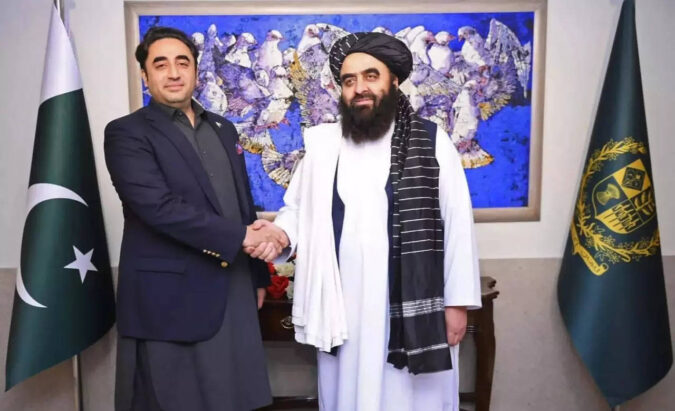ISLAMABAD: The Taliban agreed with China and Pakistan to extend the Belt and Road Initiative (BRI) to Afghanistan, potentially drawing in billions of dollars to fund infrastructure projects in the sanctions-hit country.
Chinese foreign minister Qin Gang and his Pakistani counterpart Bilawal Bhutto Zardari met in Islamabad on Saturday and pledged to work together on Afghanistan’s reconstruction process, including taking the $60 billion ChinaPakistan Economic Corridor to the Taliban-ruled nation.
“The two sides agreed to continue their humanitarian and economic assistance for the Afghan people and enhance development cooperation in Afghanistan,” according to a joint statement issued by Pakistan’s foreign ministry.
Chinese and Pakistani officials have previously discussed extending the project to Afghanistan. The cash-strapped Taliban government has expressed readiness to participate in the project and the prospect of getting much needed infrastructure investment.
The Taliban’s top diplomat Amir Khan Muttaqi travelled to Islamabad to meet his Chinese and Pakistani counterparts and reached an agreement, his deputy spokesman Hafiz Zia Ahmad said by phone.
The Taliban have also harboured hopes for China to boost investments in the country’s rich resources, estimated to be $1 trillion. The government inked its first contract in January with a subsidiary of China National Petroleum Corporation to extract oil from the Amu Darya basin. The Chinese and Pakistani ministers also stressed on the need to unfreeze Afghanistan’s overseas assets. The Taliban has been blocked from accessing about $9 billion of Afghanistan’s central bank reserves held overseas on concerns the funds will be used for terror activities.
Washington later agreed to release half of it to bolster the economy but put it on hold after the Taliban imposed certain school and work restrictions on Afghan women last year.
China, Russia, and Iran are among a handful of countries that maintain warm ties with the Taliban. They have provided aid to the Taliban, but have stopped short of formally recognising the government.
Chinese foreign minister Qin Gang and his Pakistani counterpart Bilawal Bhutto Zardari met in Islamabad on Saturday and pledged to work together on Afghanistan’s reconstruction process, including taking the $60 billion ChinaPakistan Economic Corridor to the Taliban-ruled nation.
“The two sides agreed to continue their humanitarian and economic assistance for the Afghan people and enhance development cooperation in Afghanistan,” according to a joint statement issued by Pakistan’s foreign ministry.
Chinese and Pakistani officials have previously discussed extending the project to Afghanistan. The cash-strapped Taliban government has expressed readiness to participate in the project and the prospect of getting much needed infrastructure investment.
The Taliban’s top diplomat Amir Khan Muttaqi travelled to Islamabad to meet his Chinese and Pakistani counterparts and reached an agreement, his deputy spokesman Hafiz Zia Ahmad said by phone.
The Taliban have also harboured hopes for China to boost investments in the country’s rich resources, estimated to be $1 trillion. The government inked its first contract in January with a subsidiary of China National Petroleum Corporation to extract oil from the Amu Darya basin. The Chinese and Pakistani ministers also stressed on the need to unfreeze Afghanistan’s overseas assets. The Taliban has been blocked from accessing about $9 billion of Afghanistan’s central bank reserves held overseas on concerns the funds will be used for terror activities.
Washington later agreed to release half of it to bolster the economy but put it on hold after the Taliban imposed certain school and work restrictions on Afghan women last year.
China, Russia, and Iran are among a handful of countries that maintain warm ties with the Taliban. They have provided aid to the Taliban, but have stopped short of formally recognising the government.
